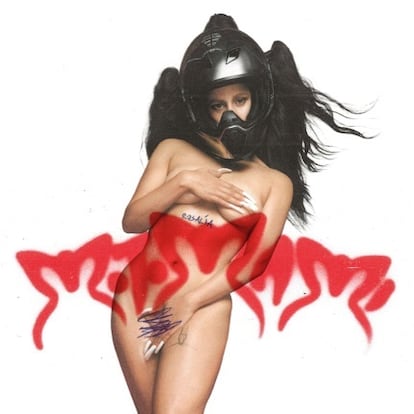Rosalía slaps down prejudices on ‘Motomami,’ a record that’s as chaotic as it is exciting
In an act of total artistic freedom, the Spanish singer breaks down the barriers between genres on her new release, directly addressing her detractors

There is a song on Rosalía’s newly released album, Motomami, where the Spanish sensation sums up what could be described as “Rosalía’s world.” “I’m just as much a flamenco singer in a Versace tracksuit as I am dressed as a dancer. / And while they talk about me behind my back, I bring out my anger with every little stab… I am who I am. / God bless Pastori and Mercé, Lil’ Kim, Tego and M.I.A., my family and freedom.”
The verse is a direct response to the debate that the Barcelona-born singer-songwriter sparks, and reflects the strengths of her narrative. It’s a lack of musical prejudice above all else: the flamenco of Niña Pastor, the empowered rap of Lil’ Kim, the experimental nature of M.I.A. and the reggaeton of Tego Caldreón.

The song in question, Bulerías, has the clearest flamenco influence on the album, and this is no coincidence – that was the genre that catapulted her to fame in 2017 with her debut release, Los Ángeles. Nor is it an accident that when she sings “I am who I am,” the autotune kicks in, a direct response to those who can’t tolerate her mashing up of different cultural styles.
We can safely say that Motomami is not El Mal Querer, her previous record that came out in 2018. But that is not important. Where that record was filled with Lorcian symbolism, drama and angst within an ideological narrative of love and feminine strength, in this release there is uproar, fun, reggaeton, chaos, mischief and the breaking down of borders between musical genres. This is no small achievement. The record also manages to portray the state of mind of the singer, who has one foot firmly planted in the United States, often spends time in Latin America, has a Puerto Rican boyfriend (Rauw Alejandro, a reggaeton star), glamorous friendships, and enviable photos on her Instagram account…
On Motomami, a one-minute song that seems to have been recorded by the sound engineer’s nephew during a coffee break actually counted on the input of 14 different people and saw the inside of three different studios. The whole record benefits from the talent she is able to assemble – Pharrell Williams, James Blake and The Weeknd, for example – which helps the end result to be something of a patchwork, without the unifying strength of El Mal Querer.

There are 16 songs, for a total of 42 minutes, but only two tracks that are longer than four minutes. Most are somewhere between 2.30m and 3m, the estimated time, according to the gurus of the new pop, for listeners not to get bored.
Despite all of this, it’s still a solvent and exciting record, because it takes risks, reformulates styles and gets the right result. Rosalía is more interested in breaking down barriers than just crossing them. This is good news for those who try but fail to do this with reggaeton. Rosalía, however, manages to squeeze the genre, adding the depth of flamenco, modernizing it with saturated electronica and turning it into something different.
Her immersion in American culture results in a mix of English phrases and slang, but that just serves to enrich the discourse. There’s humor and hedonism on the record, because Rosalía appears to be the only person in this world who, after a night of partying, can get up without a hangover and enjoy a romantic breakfast. That’s just what her life is like right now.
The feeling that you are left with after listening to Motomami is that anything is possible with this artist, and that whatever she comes up with next will be just stimulating and that she could well record something as sublime as El Mal Querer at any time. If the essence of music is freedom, there is no other global star who is as creatively free as she is right now. That’s the luck she has of being Spanish…
Tu suscripción se está usando en otro dispositivo
¿Quieres añadir otro usuario a tu suscripción?
Si continúas leyendo en este dispositivo, no se podrá leer en el otro.
FlechaTu suscripción se está usando en otro dispositivo y solo puedes acceder a EL PAÍS desde un dispositivo a la vez.
Si quieres compartir tu cuenta, cambia tu suscripción a la modalidad Premium, así podrás añadir otro usuario. Cada uno accederá con su propia cuenta de email, lo que os permitirá personalizar vuestra experiencia en EL PAÍS.
¿Tienes una suscripción de empresa? Accede aquí para contratar más cuentas.
En el caso de no saber quién está usando tu cuenta, te recomendamos cambiar tu contraseña aquí.
Si decides continuar compartiendo tu cuenta, este mensaje se mostrará en tu dispositivo y en el de la otra persona que está usando tu cuenta de forma indefinida, afectando a tu experiencia de lectura. Puedes consultar aquí los términos y condiciones de la suscripción digital.









































